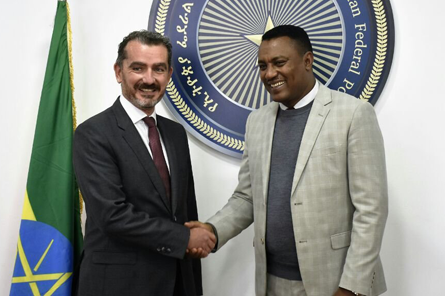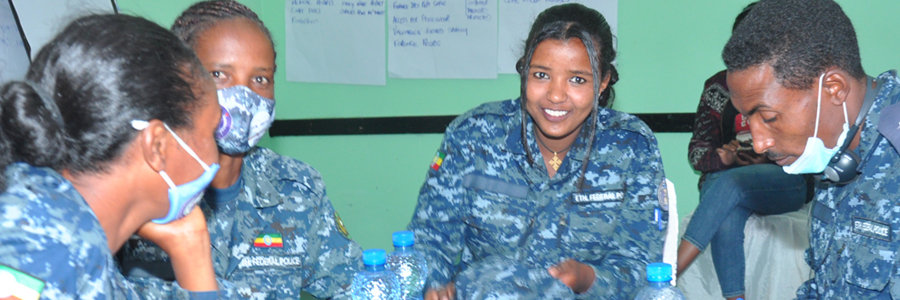Ethiopia
DCAF has been engaged in supporting national partners in Ethiopia since 2019. From 2020 to 2022, DCAF implemented an EU-funded programme aimed at supporting the reform efforts of the Ethiopian Federal Police (EFP).
Since 2021, DCAF, together with the Deutsche Gesellschaft für Internationale Zusammenarbeit (GIZ), has been implementing an EU-funded criminal justice reform programme which seeks to build the capacities of federal and regional criminal justice institutions and of the Ethiopian Human Rights Commission.
Read our factsheet to get an overview of DCAF's work in Ethiopia.

Workstreams/Projects

Support to Criminal Justice Reform in Ethiopia
Since 2021, DCAF and GIZ have been implementing an EU-funded criminal justice reform programme which aims at building the capacity of federal and regional criminal justice institutions and the Ethiopian Human Rights Commission.
The programme aims to improve investigations and prosecutions through improving management, strengthening leadership, and enhancing coordination between prosecutors and police. DCAF provides advice and guidance in developing skills, tools and processes to support reform and improved management in the criminal justice system. Beyond this, DCAF supports institutions to establish effective internal and external oversight mechanisms in the police and criminal justice system that help to ensure the accountability of institutions and individuals for their performance and conduct.
Some of the programme’s key achievements include:
- Supporting the Ethiopian Human Rights Commission in undertaking its first national inquiry involving public hearings. The inquiry focused on the rights of pre-trial detainees and the rights of women and children who were victimized in the criminal justice system.
- Support to building the capacity of the Ministry of Justice in undergoing change management training.
- Conducting an assessment of the criminal justice systems in all regions of Ethiopia.
- Conducting an assessment of the forensic systems of the EFP, with a focus on finger printing.

Support to Police Reform During Ethiopia’s Political Transition
From 2020 to 2022, DCAF implemented an EU-funded programme aimed at supporting the reform efforts of the EFP. The programme ensured that throughout a volatile period, marked by conflict and a global pandemic, there was sustained commitment to reform, and contributed to the creation of a solid foundation for advancing reforms going forward.
Some of the programme’s key achievements include:
- Development by the EFP of its first dedicated forensic development strategy, one of the first of its kind in the sub-region.
- Mentoring and coaching senior management staff of the EFP.
- Development for the EFP of a concept for a public complaints handling mechanism and a manual for handling public complaints against the police.
- Development for the EFP of a manual for management and supervision of complex investigations as well as development of investigation tools.
- Development of a training manual for the EFP on community-oriented policing.
- Review of the criminal investigations curriculum of the Ethiopian Police University (EPU).
- Implementation of a gender equality audit that identified opportunities and barriers to advance gender equality at the EPU.
- Development of a gender equality action plan to improve gender equality at the EPU.
- Development of a digital repository for the EPU and the EFP that functions as a one-stop shop for police officers to access legal and regulatory resources and references to support their work, to gain additional training, and to assist in research and professional development.
In 2019, DCAF was requested by the EU Delegation in Ethiopia to conduct a gap and needs assessment of the EFP, focusing on organizational management, performance, capacity, and accountability mechanisms. The assessment made some 40 recommendations to inform the EFP’s reform process and drive improvements in policing across Ethiopia. The findings and recommendations of the assessment were endorsed in full by the EFP and the Ethiopian Ministry of Peace, the ministry then responsible for the EFP.
In parallel with the EFP assessment, DCAF conducted an EU-mandated assessment of the broader Ethiopian criminal justice system to identify priority areas for future EU programming.
The findings and recommendations of both assessments fed into the designing of DCAF’s 2020-2022 EU-funded police reform programme and its 2021-2025 EU-funded criminal justice reform programme.
Contacts
Anne Bennett, Head of Division, Sub-Saharan Africa Division (a.bennett@dcaf.ch)
Alexander Burian, Principal Programme Manager, Sub-Saharan Africa Division (a.burian@dcaf.ch)